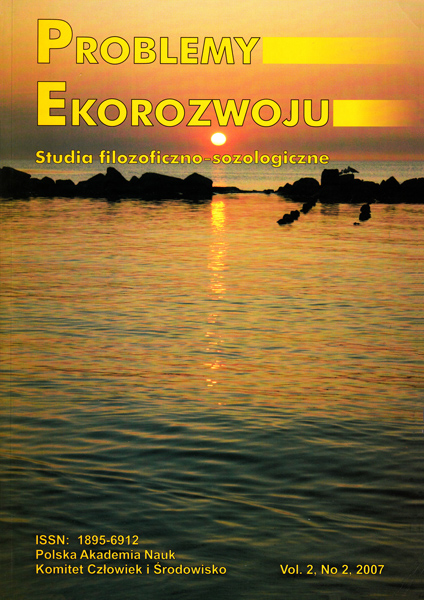Anticipation of the Idea of Sustainable Development According to Aurelio Peccei’s Concept of New Humanism
Article Sidebar
Issue Vol. 2 No. 2 (2007)
-
From the Editorial Board
Artur Pawłowski3
-
Balancing the Order of the Human World: Natural and Socio-historical Conditions
Zdzisława Piątek5-18
-
Sustainable Development in the Context of Our Philosophy of History
Leszek Gawor19-25
-
The Philosophy of Sustainable Development as a Subdiscipline of Philosophical Research
Andrzej Papuziński27-40
-
Various Systems of Values in Sustainable Development
Józef M. Dołęga41-49
-
The Scientific Worldview or a Cognitive Illusion?
Barbara Krygier51-58
-
Anticipation of the Idea of Sustainable Development According to Aurelio Peccei’s Concept of New Humanism
Helena Ciążela59-67
-
About Violent Sustainable Development
Stefan Symotiuk64-74
-
Catastrophe or Life – Contemporary Threats to Humankind and Earth
Anna Żuk75-84
-
Sustainable Development and Medial Society
Ignacy S. Fiut85-93
-
The Internet as a Tool for Building Awareness for Sustainable Development
Aleksandra Kuzior95-101
-
Concepts of Sustainable Development in Holistic Nature Studies
Jan Sandner103-107
-
Book Review: Marek M. Bonenberg: Tesknota za Olduvai. Artykuły i eseje ekofilozoficzne, Kraków 2006
Ignacy S. Fiut109-111
Archives
-
Vol. 6 No. 2
2011-07-01 19
-
Vol. 6 No. 1
2011-01-03 18
-
Vol. 4 No. 2
2009-07-01 19
-
Vol. 4 No. 1
2009-01-05 22
-
Vol. 3 No. 2
2008-07-01 19
-
Vol. 3 No. 1
2008-01-02 12
-
Vol. 2 No. 2
2007-07-02 13
-
Vol. 2 No. 1
2007-01-02 11
-
Vol. 1 No. 2
2006-07-03 15
-
Vol. 1 No. 1
2006-01-02 8
Main Article Content
Authors
Abstract
Gro Harlem Brundtland’s consideration of “sustainable development” is not the first attempt to cover such issues. Among the concepts considered since U Thant’s report, special attention must be focused on “new humanism”, as developed by Aurelio Peccei. This concept was created during discussions about one of the most important documents constructing an awareness of our responsibility for future: “Limits to Growth”, which was published in 1972 as a report by the Club of Rome. It sets a precedent for thinking in terms of “sustainable development”. Its ethical message stresses the moral aspects associated with humankind taking a responsible attitude towards the conditions and character of existence on Planet Earth. The crux of Aurelio Peccei’s concept is the emphasis it places on the need to connect material changes with the reorientation of human sensitivity and spirituality. Peccei’s “new humanism”, at the centre of which lies the issues of humanistic reorientation of contemporary culture, cooperation and conciliation with nature, is still valid.
Keywords:
References
BOTKIN J. W., ELMANDJRA M., MALIZTA M., Uczyć się bez granic. Jak zewrzeć „lukę ludzką”? Raport Klubu Rzymskiego, PWN, Warszawa 1982.
BURCHARD-DZIUBIŃSKA M., Koncepcja trwałego i zrównoważonego rozwoju – kłopotliwy owoc decyzji politycznych, w: Ekonomia a rozwój zrównoważony. Tom I. Teoria i kształcenie, red. Piontek F., Wyd. Ekonomia i Środowisko, Białystok 2001.
WCED, Our Common Future, Oxfrod UniversityPress, Oxford.
CIĄŻELA H., Problemy i dylematy etyki odpowiedzialności globalnej, Wyd. APS, Warszawa 2006.
MEADOWS D. H., MEADOWS D., RANDERS J., BEHRENS III W. W., Granice wzrostu, PWE, Warszawa 1973.
MOLL P., From Scarcity to Sustainability. Futures Studies and the Environment: The Role of the Club of Rome, Verlag Peter Lang, Frankfurt am Main 1991.
PECCEI A., Die Qualität des Menschen. Plädoyer für einen neuen Humanismus, Deutsche Verlags – Anstalt GmbH, Stuttgart 1977.
PECCEI A., Przyszłość jest w naszych rękach, PWN, Warszawa 1987.
PIONTEK F., Kontrowersje i dylematy wokół rozwoju zrównoważonego i trwałego, w: Ekonomia a rozwój zrównoważony. Tom I. Teoria i kształcenie, pod redakcją Piontek F., Wyd. Ekonomia i Środowisko, Białystok 2001.
STREICH J., 30 Jahre Club of Rome. Anspruch – Kritik – Zukunft, Birkhäuser Verlag, Basel – Boston – Berlin 1997.
ZABŁOCKI G., Rozwój zrównoważony - idee, efekty, kontrowersje (perspektywa socjologiczna), Wyd. UMK, Toruń 2002.
Article Details
Abstract views: 59
License

This work is licensed under a Creative Commons Attribution-ShareAlike 4.0 International License.


